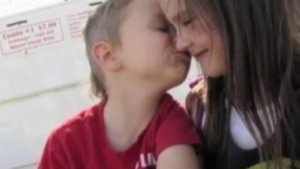Sex Education and the Child with Mental Illness
It was a perfectly innocent scene--my boys, ages 10 and 3, sitting on the couch watching a mild-mannered cartoon. The three of us watched an animated teenage boy kiss his animated teenage girlfriend--nothing pornographic, just a light peck on the cheek.
And, out of nowhere, the older boy announces:
"I can't wait til I have a girlfriend, 'cuz I'm gonna have sex!"
Aaaaaand that's about when my heart stopped. 
Once I recovered, I asked Bob--my son, who has been diagnosed with bipolar disorder, ADHD, and possible mild Asperger's--if he even knew what that meant. Looking like the cat who had sex with the canary, he replied: "I guess not."
Now is the time I begin to regret having had children. No parent looks forward to The Talk. I, especially, dread it because my son's various psychiatric diagnoses render him considerably less mature than his peers, and I have no idea what he will do with that new-found information.
One obvious example--Bob's problems with impulse control, and his propensity to blurt out things he doesn't quite comprehend (such as "I'm going to have sex.") Additionally, Bob has a certain lack of physical impulse control--what happens if (when) he gets "handsy" at school?
Maturity, comprehension and my personal discomfort aside, someone will have to give him the Facts of Life (biological and otherwise) at some point. His "more sophisticated" peers are more than happy to share their limited (and typically inaccurate) knowledge, which could create even bigger problems for Bob. And although his Internet access is limited at home and school, friends (I've learned) don't always have such strict controls.
 Mark Hutten, MA, offers some advice on his website for parents of Asperger's children. Hutten advises parents "start with the very basics of sexuality, and move on to dating and relationships, since the social ability of a person is so intertwined with their sexuality." Hutten adds parents need to be explicit, as "subtle" explanations may either be misunderstood or missed entirely. Clear direction as to what is/isn't appropriate (sexual boundaries) is absolutely necessary for children with social skills deficiencies.
Mark Hutten, MA, offers some advice on his website for parents of Asperger's children. Hutten advises parents "start with the very basics of sexuality, and move on to dating and relationships, since the social ability of a person is so intertwined with their sexuality." Hutten adds parents need to be explicit, as "subtle" explanations may either be misunderstood or missed entirely. Clear direction as to what is/isn't appropriate (sexual boundaries) is absolutely necessary for children with social skills deficiencies.
Hutten suggests the amount of information to give a child should correspond with the child's age level, regardless of maturity. (Hopefully, your child's peers will gain knowledge at the same level.) Sex and relationship education for children with emotional immaturity and/or social skills deficits is an ongoing process--as a child reaches the age of more intimate relationships and dating, parents should maintain an open dialogue to address these more complex issues.
To say I'm not looking forward to The Talk is an understatement. But I know--as with 2 a.m. vomit and dirty diapers--this is merely another part of parenting and not optional.
APA Reference
McClanahan, A.
(2012, April 5). Sex Education and the Child with Mental Illness, HealthyPlace. Retrieved
on 2026, March 2 from https://www.healthyplace.com/blogs/parentingchildwithmentalillness/2012/04/sex-education-and-the-child-with-mental-illness
Author: Angela McClanahan
I so feel your pain!! I have a daughter, who is 10 and has multiple issues, including bipolar disorder, and developmental delays stemming from a yet-to-be-diagnosed brain disorder ( 4 MRI's show damage, but we still have no diagnosis). I know we need to have the "talk" and I do my best to be open, but her very limited language makes it difficult. But, she is becoming quite the flirt! Yikes! Thanks for bringing up the subject with such honesty and humor! I'm so glad to find you on Twitter.